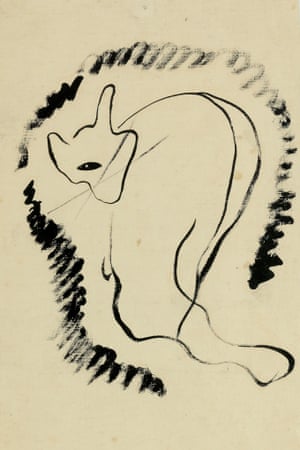Laurie Lee, (June 26, 1914 to May 13, 1997) the British writer, also sketched, though some were not discovered til after his death. The one which fits in our blog is called "The One-Eyed Cat", and we can see a thumbnail version, accompanying a description of how it came to his daughter's attention.
'That grey art folder was all but forgotten until a few years after Dad had died. Mum came across it under his bed, wedged between two old suitcases upon which my cat Walter had both slept and died. I felt miserable after losing my 18-year-old feline friend but elated that Walter had led me to discover the folder. Mum then told me that years ago Dad wanted me to have it. So he had thought about it after all.'

Valerie Grove, wrote Laurie Lee: The Well-Loved Stranger, (1999), and a book review lets us glimpse the man who drew the cat above.
'To those who were made to read Cider With Rosie at school, Laurie Lee is English literature's Laura Ashley, an artist, commercialised by success, who branded a slice of English rural experience with an ineradicable pattern. He also had the rather rare distinction of becoming a minor but apparently secure part of the English literary canon while he was still alive....
.....
'An 'artist' from his earliest years, the young Laurence Lee was precociously successful, a self-taught country boy who might have stepped from the pages of a Hardy novel, Jude the Obscure perhaps. He was born in 1914 and his biography takes us back into a half-forgotten, countrified world of English language and literature bordered by the Great War, a lost paradise to which he would return again and again in his work.
'His personal legend begins in 1934 when, ... he simply upped sticks and went to London. ... Once in the city, the good-looking country boy who could write, paint and play the fiddle, led an itinerant existence that was temporarily interrupted when he went off to fight in the Spanish Civil War (a claim some still dispute, though Grove argues that here his self-mythologising propensities were to blame). On his return from Spain, he was quickly taken up by members of the London literary establishment, notably John Lehmann and Stephen Spender.
'One of the incidental pleasures of this biography is its portrait of the wartime world of books, a now-dispersed milieu that extended from Bloomsbury, Covent Garden and Soho through Fitzrovia, to Broadcasting House, by way of any number of pubs and cheap restaurants. He also worked for the BBC....that Thirties forcing-house of youthful talent.... Here, although he saw himself as a poet, it was the melody of his documentary prose that marked him out.
'Like many precocious writers, Lee never really grew up artistically. Valerie Grove makes the interesting point that by 1947 several publishers had already commissioned the entire prose output of Laurie Lee's creative life. When Cider With Rosie was eventually published, to astounding success in 1960, it was an autobiography notable for the fact that it stopped when its hero was 23, the year he left his native Gloucestershire. Laurie Lee was then 45. He would write nothing to match it ever again. In his prime he was known as a poet who had written a book, but in the end he would be known simply as a prose writer who had formerly written poems.
'The clue to Lee's artistic failure probably lies in his personal life. He was raised among women and had the complex and varied romantic life of an emotional Peter Pan. In addition to countless affairs and liaisons (London in the Second World War seems to have been simply brimming over with hormones), Lee had the misfortune to fall in love with Lorna Wishart, a passionate married woman with children, who would be his muse during the early part of his career and, who would finally hurt him into the dark, pessimistic silence that dominated his forlorn last years.
'These are, indeed, terrible to contemplate. Deaf, nearly blind, and often the worse for drink, he haunted the Chelsea Arts Club and the nearby Queen's Elm, living in old age the kind of destitute life he had gone in search of as a young man. Valerie Grove says he 'wore the secret contented smile of a man who all his life has been cosseted and adored by women', but behind that smile was the agony of having nothing more to say. The day before he died he called out to his wife: 'I've got a secret.' His wife and daughter listened, but nothing came. ...'
Laurie Lee is not well-known in the States, but the quality of this cat rendering suggests he should be.
No comments:
Post a Comment